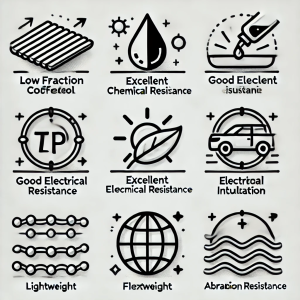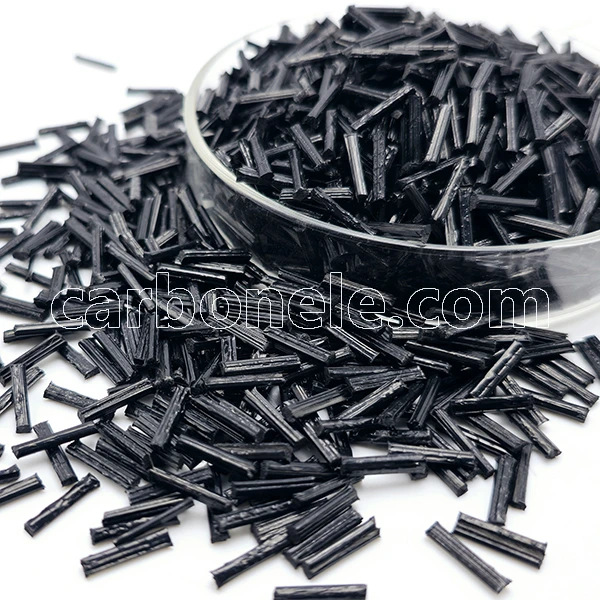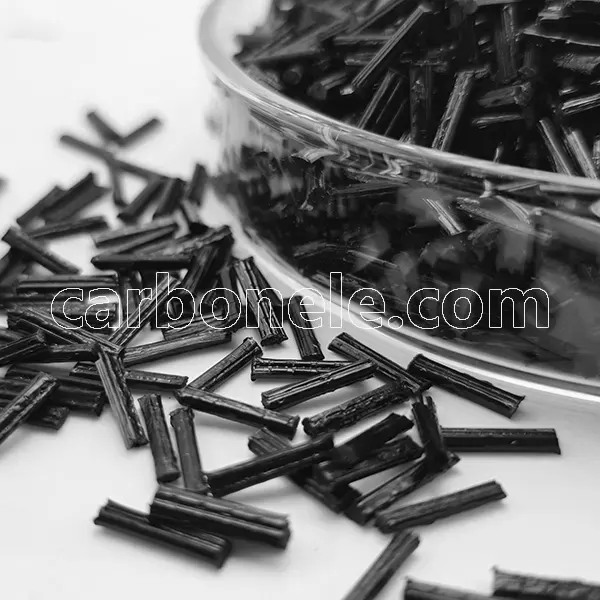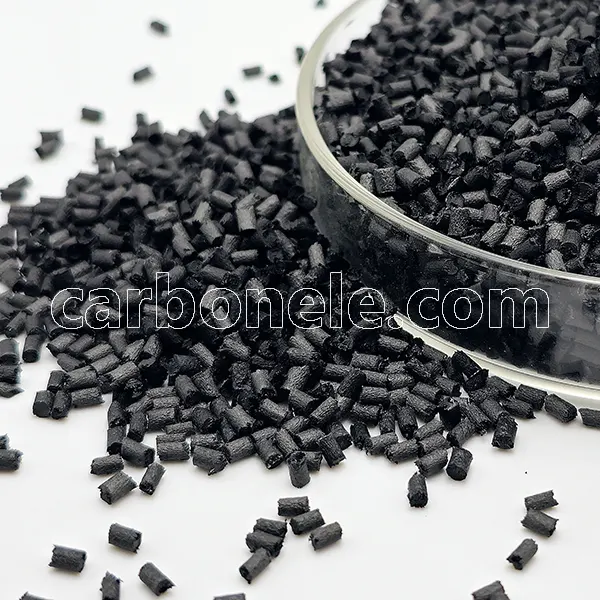Differents between PPS and PPS-CF (Polyphenylene Sulfide – Carbon Fiber Reinforced Plastic)
1. High-Temperature Resistance:
- The Heat Deflection Temperature (HDT) of PPS is around 280°C, and when carbon fibers are added, the heat resistance of PPS-CF improves to 260°C-270°C. Despite this, PPS-CF still maintains good mechanical properties in high-temperature environments.
- The operating temperature range of PPS is –40°C to 200°C, while PPS-CF, due to its enhanced characteristics, can withstand temperatures up to 300°C for short periods.
2. Mechanical Properties:
- The tensile strength of PPS is around 100 MPa, while PPS-CF has a tensile strength ranging from 200 MPa to 250 MPa, almost double that of unreinforced PPS, giving it much higher load-bearing capacity, making it suitable for structural parts.
- PPS-CF’s bending strength ranges from 250 MPa to 350 MPa, significantly increasing its rigidity, making it ideal for precise mechanical and automotive parts such as engine components and bearing housings.
- The tensile modulus (rigidity) of PPS-CF typically reaches 12-15 GPa, much higher than that of unreinforced PPS (around 3-5 GPa), providing better resistance to deformation.
- The impact resistance of PPS-CF typically ranges from 10-15 KJ/m², which is higher than that of unreinforced PPS (around 5-10 KJ/m²), indicating improved impact resistance.
3. Chemical Resistance:
- PPS has excellent chemical resistance and can withstand exposure to concentrated sulfuric acid, hydrochloric acid, sodium hydroxide, ammonia, and other aggressive chemicals. The carbon fiber reinforcement further enhances this resistance, making PPS-CF ideal for parts in the chemical industry.
- PPS-CF is highly resistant to most organic solvents (such as alcohols, ethers, and ketones). Even at high temperatures, chemicals do not significantly degrade its physical properties.
4. Friction and Wear Properties:
- The friction coefficient of PPS-CF generally ranges from 0.2 to 0.3, offering good self-lubricating properties, making it ideal for applications with high wear conditions such as automotive drivetrains and bearings.
- Under high load and friction conditions, the wear rate of PPS-CF is significantly lower than that of regular plastics and other composites, providing extended service life and maintaining surface integrity.
5. Dimensional Stability:
- The coefficient of thermal expansion (CTE) of PPS-CF typically ranges from 20-30 µm/m·K, lower than many engineering plastics, ensuring dimensional stability even with temperature fluctuations. This property is especially valuable for precision mechanical components used in environments with temperature fluctuations.
- PPS has an extremely low water absorption rate, usually under 0.03%, and the addition of carbon fibers has minimal effect on this property, ensuring that the material will not experience dimensional changes or performance degradation due to moisture absorption.
6. Electrical Insulation Properties:
- PPS-CF retains excellent electrical insulation properties, with a volume resistivity of about 10^14 Ω·cm, making it suitable for electrical and electronic applications.
- The dielectric constant of PPS-CF at 1 MHz is approximately 3.0, making it ideal for applications requiring low dielectric loss and electrical insulation, such as high-frequency circuit boards and connectors.
7. Lightweight Characteristics:
- The density of PPS-CF is about 1.45 g/cm³, which is significantly lighter than metals like aluminum (2.7 g/cm³) and steel (7.8 g/cm³). This weight advantage is especially important in industries like aerospace and automotive, where lightweight materials help improve fuel efficiency and overall performance.
Applications of PPS-CF:
- Automotive Industry: Used in engine components, fuel systems, automotive electrical parts, bearings, gears, etc.
- Aerospace: Its high heat resistance, lightweight, and high strength make it ideal for engine components, wing structures, and other aerospace parts.
- Chemical Industry: Due to its excellent chemical resistance, it is widely used in chemical pumps, valves, pipe liners, etc.
- Electronics and Electrical: Used extensively in high-frequency circuit boards, connectors, and insulation materials.
summary table:
| Performance Feature | PPS | PPS-CF (Carbon Fiber Reinforced) | Application Areas |
|---|---|---|---|
| High-Temperature Resistance | – Heat Deflection Temperature: 280°C | – Heat Deflection Temperature: 260°C-270°C | – Automotive, Aerospace, Chemical Industries |
| – Operating Temperature Range: -40°C to 200°C | – Operating Temperature Range: up to 300°C (short periods) | ||
| Mechanical Properties | – Tensile Strength: ~100 MPa | – Tensile Strength: 200-250 MPa (almost double) | – Structural parts, Automotive, Mechanical Components |
| – Bending Strength: ~100 MPa | – Bending Strength: 250-350 MPa | ||
| – Tensile Modulus: 3-5 GPa | – Tensile Modulus: 12-15 GPa | ||
| – Impact Resistance: 5-10 KJ/m² | – Impact Resistance: 10-15 KJ/m² | ||
| Chemical Resistance | – Resistant to acids, alkalis, and solvents | – Excellent chemical resistance at high temperatures, enhanced by carbon fiber | – Chemical Industry, Pumps, Valves, Pipes |
| Friction and Wear Properties | – Friction Coefficient: 0.2-0.3 | – Friction Coefficient: 0.2-0.3 | – Automotive drivetrains, Bearings, Mechanical parts |
| – Wear Rate: Higher than carbon fiber composites | – Low wear rate, ideal for high-friction applications | ||
| Dimensional Stability | – Coefficient of Thermal Expansion: ~40-50 µm/m·K | – Coefficient of Thermal Expansion: 20-30 µm/m·K | – Precision Mechanical Parts, Temperature-Fluctuating Environments |
| – Water Absorption: ~0.03% | – Water Absorption: ~0.03% | ||
| Electrical Insulation Properties | – Volume Resistivity: ~10^14 Ω·cm | – Volume Resistivity: ~10^14 Ω·cm | – Electronics, Electrical Applications |
| – Dielectric Constant: ~3.2 | – Dielectric Constant: ~3.0 | ||
| Lightweight Characteristics | – Density: ~1.45 g/cm³ | – Density: ~1.45 g/cm³ | – Aerospace, Automotive, Lightweight Applications |
| Application Area | Examples of Use |
|---|---|
| Automotive Industry | Engine components, fuel systems, bearings, gears, etc. |
| Aerospace | Engine components, wing structures, etc. |
| Chemical Industry | Pumps, valves, pipe liners, etc. |
| Electronics and Electrical | High-frequency circuit boards, connectors, insulation materials, etc. |
If you want to get more information about PPS-CF, you can vist our Youtube.

Feature Product
-
PA12 LCF30 for Drone Fuselages & Wings
What do you know about PA12 LCF30? PA12 ...
-
Competitive Price PA6 LCF30 Composites
What’s it? PA6 LCF30, which stands...
-
ABS CF10 Compound ABS 10%CF Thermoplastic Compo...
What’s ABS CF10? ABS CF10 refers t...









